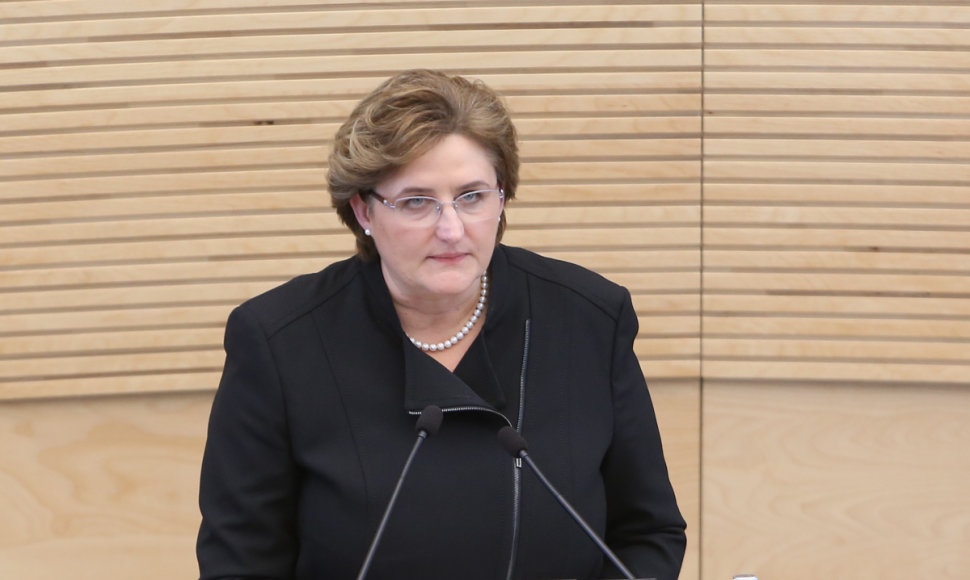She was successful – last Thursday, the majority of MPs voted her into the second-highest office in the state, helping Graužinienė, one of the most loyal followers of Viktor Uspaskich, the notorious founder of the Lithuanian Labour Party, reach the height of her political career.
Last year, she was a candidate for the office of the minister of social security and labour, but President Dalia Grybauskaitė rejected her as not competent enough for the post. This time however, she was deemed good enough to replace her fellow party member Vydas Gedvilas, who unexpectedly resigned last Wednesday.
Having woken up on Thursday morning as an ordinary MP, she returned home in the evening as the second-highest state official in the country. Her candidacy was supported by 77 MPs in Lithuania's 141-seat parliament. Thirty-nine politicians voted for her rival, liberal Eugenijus Gentvilas.
Career started in construction company
Loreta Graužinienė was born on 10 January 1963 in Rokiškis, a small town in the north-east of Lithuania. She currently lives in Ukmergė.
She graduated from a secondary school in Žiežmariai. In 1992, she earned a degree in accounting from the Agriculture Academy (now Aleksandras Stulginskis University).
Since 1982, she worked as an accountant at the directorate of Durpynų Statyba (Marshlands Construction), later in an Ukmergė district kolkhoz and Ukmergė Agriculture Technology Cooperative.
Between 1986 and 1992 she worked as an economist in Ukmergė, later served as chief accountant for several local companies. Between 1994 and 2004 she lectured at Ukmergė Superior Agriculture School (now Ukmergė Superior Business School). In 1996, Graužinienė set up a private firm offering accounting, auditing services, tax consulting.
Graužinienė was first elected to parliament in 2004. She was also picked the leader of the Labour Party parliamentary group (until July 2006) and joined the parliamentary committees of Budget and Finance, Audit, and European Affairs. She was reelected to parliament in 2008, chaired the Audit Committee.
After the last parliamentary elections in 2012, Graužinienė worked in the Social Affairs and Labour Committee, but this year returned to the Audit Committee.
Graužinienė is currently the vice-chairman of the Labour Party (when Viktor Uspaskich, the then chairman of the party, fled to Russia in May 2006, she even led the party for a while), leader of the party's Ukmergė chapter, member of the Audit House, honorary member of Ukmergė Literary Society.
In 2007, she was elected to Ukmergė district council, but decided to remain in parliament. In 2009, she was proposed as her party's candidate in presidential election. Initially, the Labour Party had decided not to have their candidate vie for the office, but they changed their mind once they discovered that Grybauskaitė, a European Commissioner at the time, was running.
“I am a simple person, just like everyone else,” Graužinienė said about herself after submitting her papers to the Central Electoral Commission in 2009.
Graužinienė is married to Julius Graužinis, a transport engineer. They have two sons, Eimantas and Julius.
“I will not let myself be humiliated”
According to political observer Vincentas Vobolevičius, it will be more convenient for the Labour Party to have Graužinienė as parliament speaker rather than Gedvilas – this might make communication with President Grybauskaitė smoother. “Graužinienė is more strategically convenient for them. In relations with the president, it is better to have a woman and not a person from the social elite,” he notes.
However, the experience that Graužinienė has of interacting with the president is far from smooth. Last year, when President Grybauskaitė was putting together the cabinet, she made a point of examining candidates' command of foreign languages. In her CV, Graužinienė claims she speaks Russian, German, and English. However, her fluency must have raised some doubts for the president, who rejected her as a minister.
Graužinienė later spoke about the meeting with perceivable grudge. She said that Grybauskaitė had no complaints about her competencies, so she was left baffled as to why her candidacy had been rejected.
Graužinienė spoke about the meeting, which was also attended by two presidential advisers and a man she could not identify, to the Respublika daily: “I knew that the president did not speak any German, so I was puzzled about whom I was supposed to talk to in German. I thought that it would be her adviser Nerijus Udrėnas, but I soon realized I'd have to speak with the stranger who was probably a specialist of German.
“But I did not understand the format of the conversation – was I supposed to talk to the president via an interpreter, or would I be examined by that man like a school student? Since I am not in a habit of talking to myself, I realized I would have to recite my homework to that stranger, like a schoolgirl.
“Certainly, I felt insulted, I saw it as open disrespect shown not just to me, but the the German language, too. I then told the president that I would not be made to take an exam in her office. Grybauskaitė immediately asked her advisers and that man to leave – and they did.”
Graužinienė added that she would never let herself or other people be humiliated.























